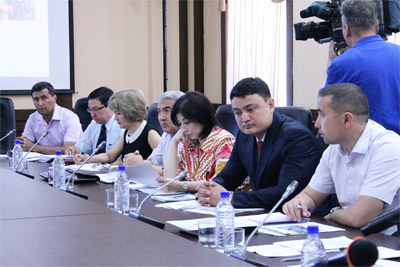
CCI and UNDP promote inclusive business models in Uzbekistan
The main aim of the round table was to encourage companies and other interested parties to identify and support opportunities to include low-income population in value chain and elaborate on ways of implementing them. The event was organized by the UNDP project “Business Forum of Uzbekistan (Phase III)” in collaboration with Chamber of Commerce and Industry of Uzbekistan (CCI).
Development of inclusive markets in Uzbekistan is a very important step in providing jobs and decreasing unemployment levels among low-income layers of population. It has been pointed out in the course of discussions that it is crucial to consider inclusive business models as an element of overall economic strategy in order to include vulnerable people in business activities in various sectors of national economy.
The experts and representatives from private, governmental, public and academic sectors reviewed successful examples and potential ideas for implementation of new inclusive projects in the future. The participants also discussed ways of overcoming challenges and obtaining necessary resources for scaling up implementation of successful inclusive projects in Uzbekistan.
Inclusive business projects are aimed at reducing poverty in commercially profitable ways. It can be achieved through including vulnerable population, such as low-income population or people with disabilities, into different stages of value chains of companies. By doing so, low income population receive a chance to become a part of inclusive-oriented company, for example as employees, suppliers, distributors, retailers, service providers or consumers.
Connecting businesses and people on the basis of mutually-beneficial cooperation, inclusive business models represent a unique way of doing business, where all involved parties benefit. For companies, inclusive business models are opportunities for expansion and competitive advantage. For development agencies and governments, inclusive businesses embody an effective approach to socio-economic development. Finally, for population, inclusive business models serve as a source of better life, social inclusion, employment and sustainable livelihoods.
Over the years of successful partnership, CCI and UNDP have implemented three successful socially inclusive business models in different regions of Uzbekistan, with the support of international partners. The Milk Collection Centre in Namangan purchases milk from small-scale farmers at market prices, and by this guarantees sustainable livelihoods to local population who keep livestock. In Yangiyul area, the waste management system was implemented through a public-private partnership, which helps to address the problems of pollution, keeping the area healthy and safe for living. People living in Khorezm region also benefit from socially inclusive initiative. A local sewing enterprise has taught young vulnerable women, including those with disabilities, handicraft skills, and subsequently provided them with employment.
It is expected that the roundtable on growing inclusive markets will draw attention of private sector to this area and will contribute to increasing the amount of investments in socially inclusive initiatives. It is considered a priority to support wellbeing of population, especially women and youth, by providing access to essential goods and services while creating sustainable employment and income opportunities. The outcomes of the round table will be used in development of proposals on new inclusive projects and their financing prospects, as well as serve as guidelines for further development of inclusive markets in Uzbekistan.
The joint project of the UNDP and the Chamber of Commerce and Industry of Uzbekistan "Business Forum of Uzbekistan (Phase 3)" provides continuous support in identifying and supporting inclusive business initiatives in the country.